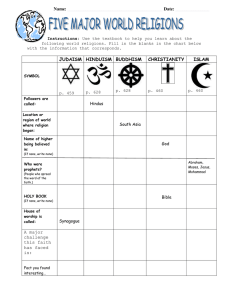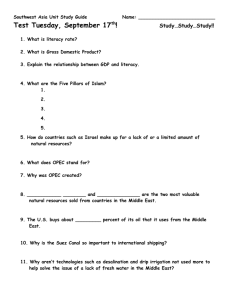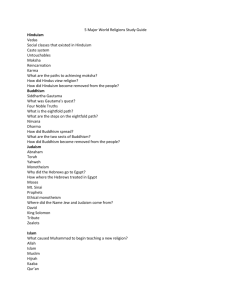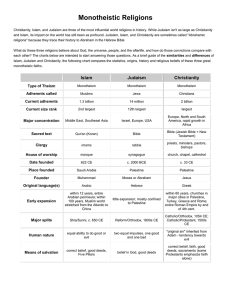File
advertisement
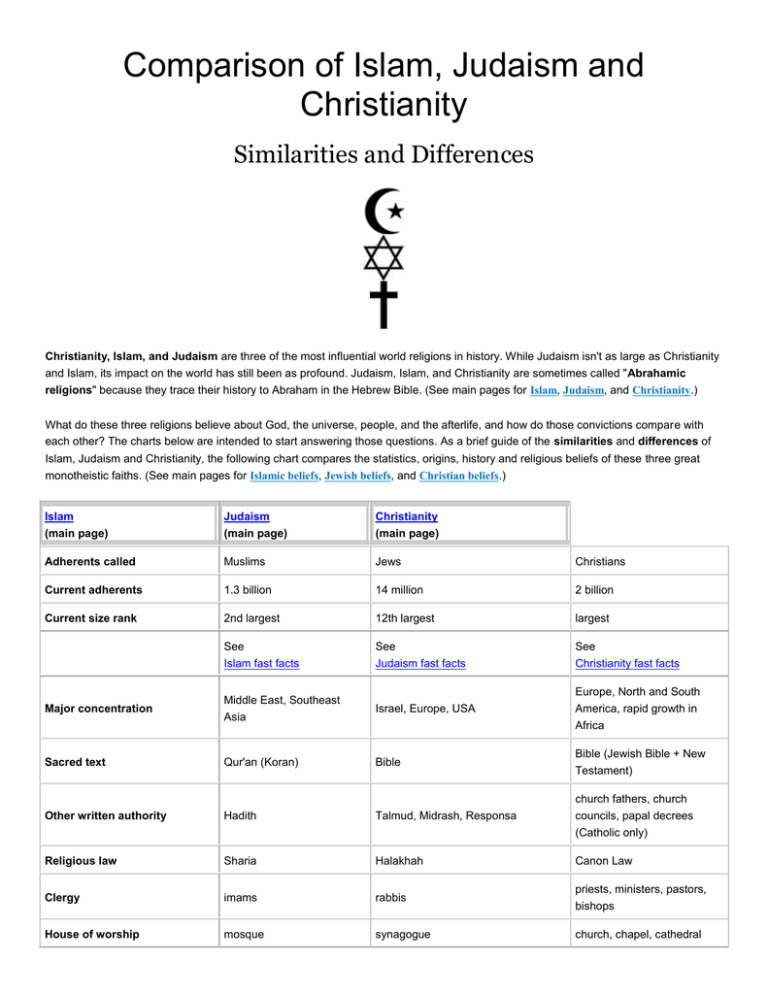
Comparison of Islam, Judaism and Christianity Similarities and Differences Christianity, Islam, and Judaism are three of the most influential world religions in history. While Judaism isn't as large as Christianity and Islam, its impact on the world has still been as profound. Judaism, Islam, and Christianity are sometimes called "Abrahamic religions" because they trace their history to Abraham in the Hebrew Bible. (See main pages for Islam, Judaism, and Christianity.) What do these three religions believe about God, the universe, people, and the afterlife, and how do those convictions compare with each other? The charts below are intended to start answering those questions. As a brief guide of the similarities and differences of Islam, Judaism and Christianity, the following chart compares the statistics, origins, history and religious beliefs of these three great monotheistic faiths. (See main pages for Islamic beliefs, Jewish beliefs, and Christian beliefs.) Islam Judaism Christianity (main page) (main page) (main page) Adherents called Muslims Jews Christians Current adherents 1.3 billion 14 million 2 billion Current size rank 2nd largest 12th largest largest See Islam fast facts See Judaism fast facts See Christianity fast facts Israel, Europe, USA Europe, North and South America, rapid growth in Major concentration Middle East, Southeast Asia Africa Bible (Jewish Bible + New Sacred text Qur'an (Koran) Bible Other written authority Hadith Talmud, Midrash, Responsa councils, papal decrees (Catholic only) Religious law Sharia Halakhah Canon Law Clergy imams rabbis House of worship mosque synagogue Testament) church fathers, church priests, ministers, pastors, bishops church, chapel, cathedral Main day of worship Friday Saturday Sunday Church and state integrated separate separate Date founded 622 CE unknown c. 33 CE Place founded Saudi Arabia Palestine (def) Palestine Founder Muhammad Moses or Abraham Jesus See See See History of Islam History of Judaism History of Christianity Arabic Hebrew Aramaic, Greek Original language(s) within 12 years, entire Arabian peninsula; within Early expansion 100 years, Muslim world stretched from the Atlantic little expansion; mostly confined to Palestine to China within 60 years, churches in major cities in Palestine, Turkey, Greece and Rome (map); entire Roman Empire by end of 4th cent. Catholic/Orthodox, 1054 CE; Major splits Shia/Sunni, c. 650 CE Reform/Orthodox, 1800s CE Catholic/Protestant, 1500s CE Type of theism strict monotheism strict monotheism Trinitarian monotheism Ultimate reality one God one God one God Names of God Allah (Arabic for God) Yahweh, Elohim Yahweh, the Holy Trinity Islamic beliefs Jewish beliefs Christian beliefs about God about God about God Other spiritual beings angels, demons, jinn angels and demons angels and demons Revered humans prophets, imams (especially in Shia) prophets saints, church fathers Islamic beliefs about human nature Jewish beliefs about human nature Christian beliefs about human nature true prophet of God, whose message has been false prophet Identity of Jesus corrupted Birth of Jesus Divine revelation virgin birth through Muhammad, recorded in Qur'an God, inerrant in original languages savior of the world normal birth virgin birth through Prophets, recorded in Bible through Prophets and Jesus (as God Himself), recorded in Bible inspired, literal word of View of sacred text Son of God, God incarnate, views vary inspired, some believe inerrant in original languages

